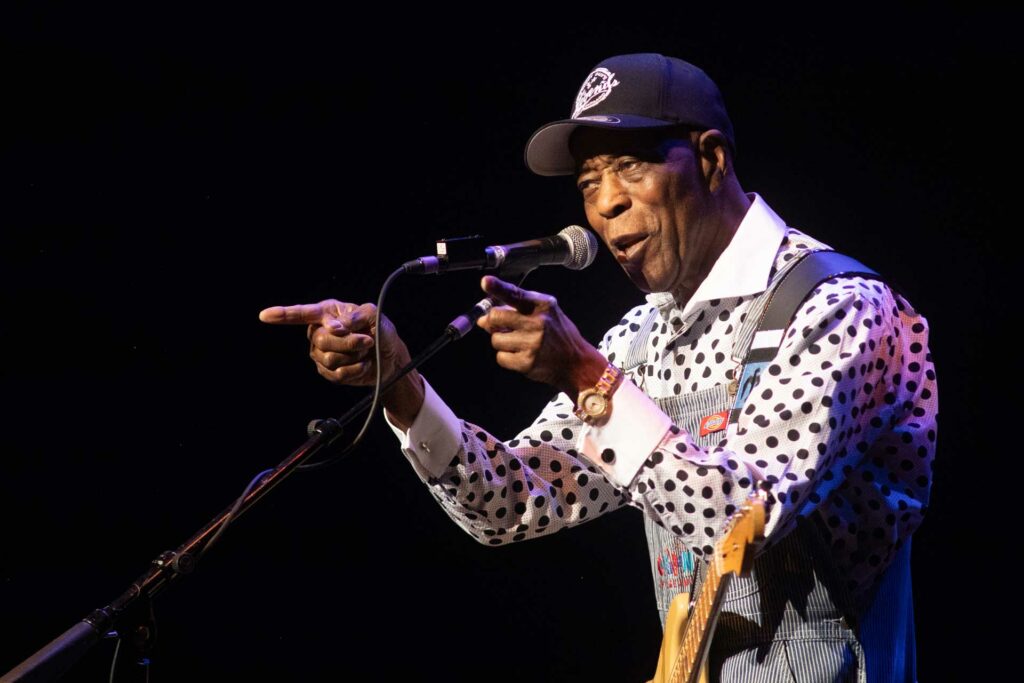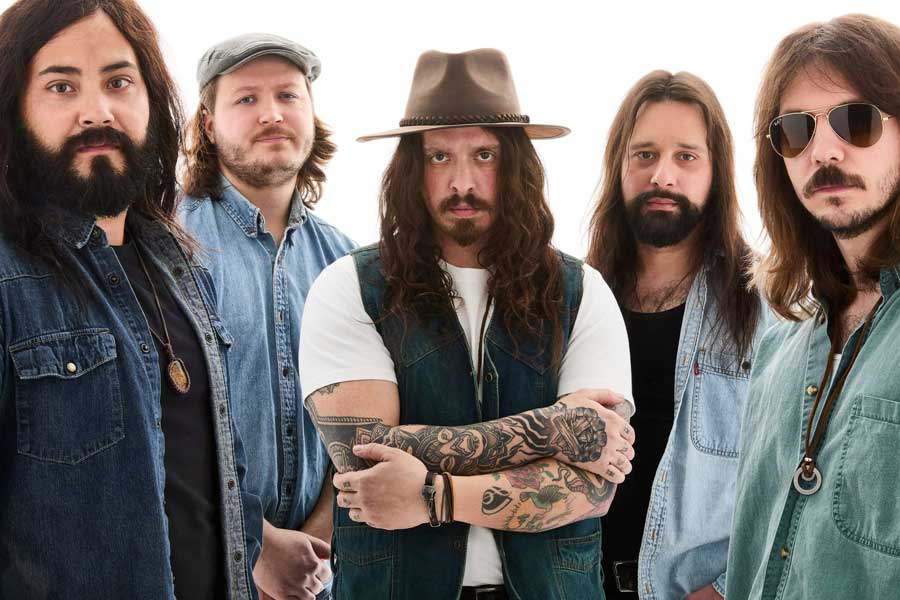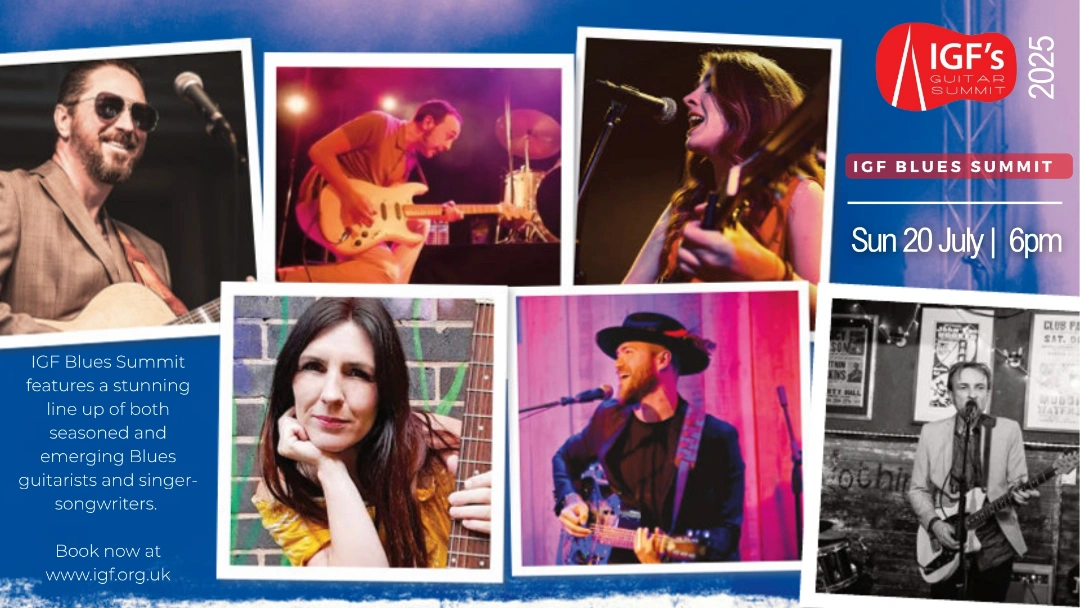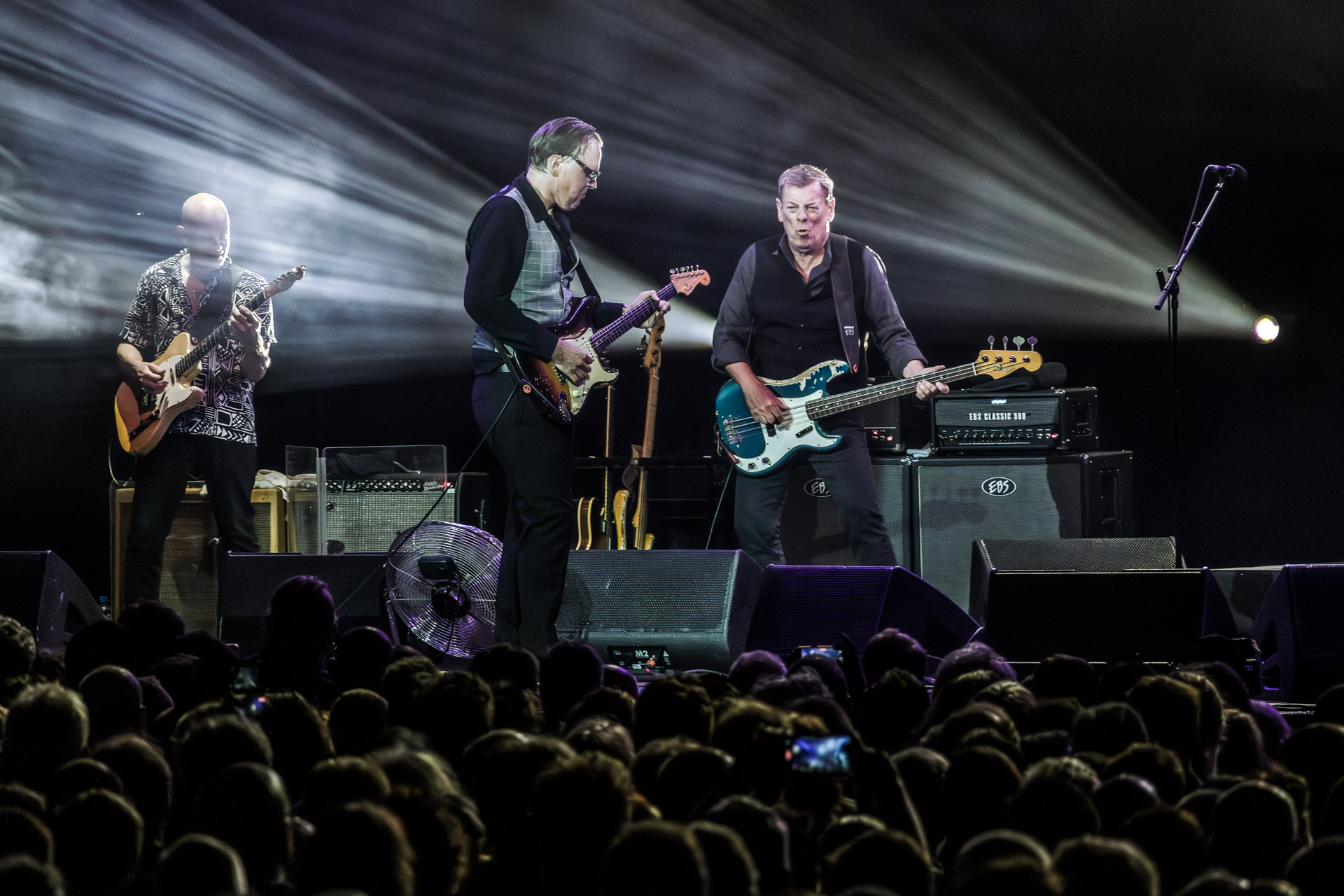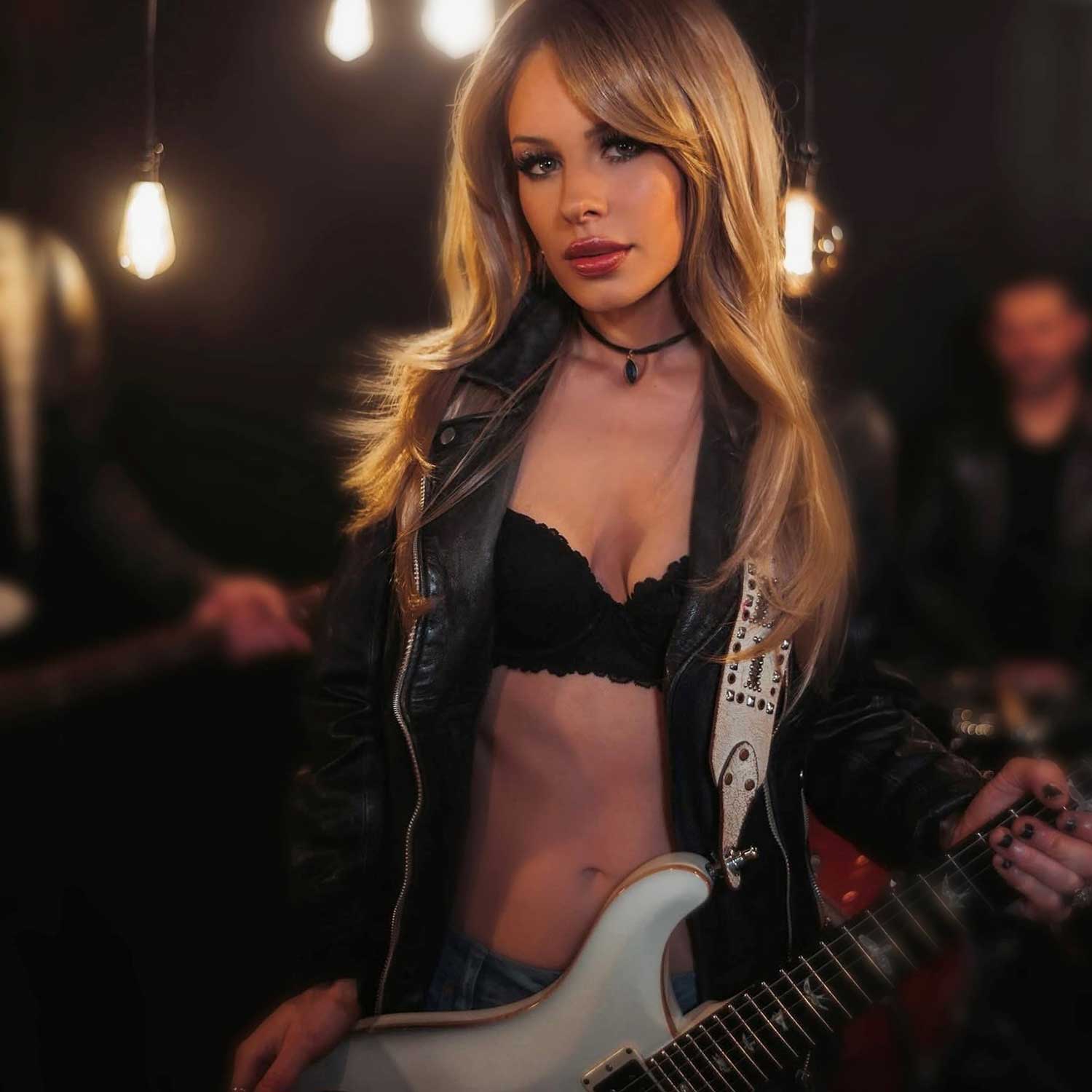Roaring back to full power after the enforced absences and restrictions of the pandemic, the Montreal Jazz Festival returned to optimum strength once again this July.
Although the word ‘jazz’ is in the title, it shouldn’t deter you from checking out this annual masterpiece of festival planning and programming, because the Festival operates on a highly inclusive basis, embracing all manner of musical genres. Of course, for our purposes, it’s the blues side of things that interests us, and I’ll come to that shortly.
Words: Andy Hughes Pictures: Laura Carbone
If you are visiting Montreal, it’s advisable, though not essential, to remember that the city’s first language is French. That’s not French as in the language you can get by with across the Channel with your GCSE phrases, it’s Quebec (pronounced Kee-beck) French which is equivalent to Geordie English – the roots are the same, but the slang phrases and seriously strong accent, combined with the break-neck speed of delivery make it a tricky proposition trying to converse anywhere beyond “Oui”, and the occasional “Non.” Fortunately, virtually everyone speaks perfect English – in all hotels and restaurants you are greeted with a smile and ‘Bonjour hi …’ a chance to get your language of preference off and running from the start. The person you are speaking to will then effortlessly continue your conversation in your language of choice. Quite an advantage for those of us whose last serious interaction with a foreign tongue ended in high school, and is now a dim and distant memory.
The Festival centres around the main thoroughfare Saint Catherine Street, which houses the Palais Des Arts, and a massive open-air square, where a number of the major acts perform for free. That’s in keeping with the Festival ethos, that a large number of concerts and performances across the nine-day event should be accessible to the audiences free of charge.
Space does not permit a full review of all the delights of the Festival’s diverse musical offerings this year, but here is a selected taster of just some of hundreds of shows laid on during the nine-day musical extravaganza – the largest of its kind in the world, and enjoying its forty-fourth wonderful year.
The Palais Des Arts has a number of superb acoustically perfect theatres within it, catering to the biggest theatre show audiences, for artists like George Benson, and a Festival highlight, the return of Robert Plant and Alison Kraus.
George Benson remains a huge draw here at the Montreal Jazz Festival, his smooth blend of soul and blues is always well received, and George continues to defy the passing of time, looking and sounding as sharp as ever.
Robert Plant And Alison Kraus at the gorgeous Salle Wilfrid Pelletier theatre was easily the standout concert for your scribe, who has been a Zeppelin fanatic for over fifty years. These days, Robert has abandoned his legendary attention-grabbing costumes and movements – he is completely content to be an ensemble player, equally generous with his attention for every member of the band who accompany himself and Alison as they work through their superlative catalogue of Americana recordings. Demonstrating how advanced for its time Led Zeppelin Four actually was, the inclusion here of Rock And Roll, Gallows Pole, and The Battle Of Evermore fitted seamlessly alongside three Everly Brothers’ songs, as Mr Plant happily enjoyed his inspirations.
Also appearing at the same stellar venue, the legendary Buddy Guy brought his particular combination of original template blues guitar, delivered with utterly shameless levels of showmanship.
Opening for the maestro was Buddy’s protégé Christone ‘Kingfish’ Ingram who at a mere twenty-four, is a beginner compared to the man himself. That said, Christone acquitted himself perfectly well, laying down a sweet and pure tone through Fresh Out, invoking the ghost of BB King as he plays with his head tipped back and eyes closed, a blissful expression on his face. He even apologised for the ‘bum notes’ he apparently played during the tastefully restrained slabs of heavy blues in Empty Promises. Christone is a regular visitor to the UK, and demands attendance for his developing skills and talent.
Also appearing at the same stellar venue, the legendary Buddy Guy brought his particular combination of original template blues guitar, delivered with utterly shameless levels of showmanship.
Opening for the maestro was Buddy’s protégé Christone ‘Kingfish’ Ingram who at a mere twenty-four, is a beginner compared to the man himself. That said, Christone acquitted himself perfectly well, laying down a sweet and pure tone through Fresh Out, invoking the ghost of BB King as he plays with his head tipped back and eyes closed, a blissful expression on his face. He even apologised for the ‘bum notes’ he apparently played during the tastefully restrained slabs of heavy blues in Empty Promises. Christone is a regular visitor to the UK, and demands attendance for his developing skills and talent.
Buddy Guy of course, was showmanship incarnate. Everything from his name on a huge sign in pink lights, to his effortless smiling delivery of a walkthrough the finer parts of his extensive catalogue. Segueing from John Lee Hooker’s Boom Boom into a savage section of Voodoo Chile, complete with the teeth-plucking solo break, in case anyone forgot that he did it first!
Rubbing the strings of his guitar against the zip of his dungarees, whooping, grinning, and totally hamming it up, this was a fine farewell to the Festival from one of its biggest draws, such a shame we will not see Buddy here again.
Another wonderful experience at the Jazz Festival, is any concert in any genre at Gesu, a compact and intimate venue created from a converted church into one of the best small venues in the city. This was the setting for the unique blend of Indian raga music and traditional blues, that is the musical mosaic created by Harry Manx. Harry provides this intriguing soundscape by playing the mohan veena, a fiendishly complex cross between an acoustic guitar and a sitar. Make Way For The Living from Harry’s highly recommended West Eats Meet album is an intimate world-weary blues-based tale with some tasteful slide guitar to go with it. Moon Goin’ Down showcases Harry’s patent percussion system, two individual foot triggers for bass drum and snare, that add a pleasing rhythm to most of his songs. And the highlight of the evening was Harry’s continuing reinvention of well-known classics – Voodoo Chile rendered on the banjo! For his entertaining stories and always intriguing musical interpretations, Harry Manx offered a wonderful evening’s entertainment for his discerning audience.
For serious blues fans, the place to be at the Montreal Jazz Festival, is the Scene Rogers, a specially erected stage and audience compound further down, and just off Saint Catherine Street. The beauty of the Festival is that virtually all the main concert venues are within around fifteen minutes’ walk of each other, and an evening stroll down to this particular area is richly rewarded.
The Montreal Jazz Festival has always been keen to reflect the quality and diversity of the Quebec, and wider Canadian blues scene, which thrives and grows year on year, and they also invite in some major international artists to add some blues sweetening to the jazz flavours.
This outdoor venue features the cream of Canadian and international blues performers, each playing two sets a night, at nine p.m. and again at eleven, and it’s free to attend, simply show up, find a space to stand or sit, and enjoy.
Defying the downpour that did not affect the audience enthusiasm one iota, Dawn Tyler Watson brought her thoroughly modern take on the great blues shouters of yesteryear down to the Scene for a rollicking run-through of her blues and gospel music. Watching her incendiary stage presence, it’s easy to see why Ms Watson received the Juno Award for The Best Blues Album. Lost was a definite concert highlight, with the rain teaming, the funereal rhythm, the scorching guitar solo, and the wonderfully impassioned vocal. This is what live blues music is all about.
Blues is a board church, and the funk-based r‘n’b sound of Blackburn Brothers, with their horn section and Hammond organ sound, demonstrated their power as a massive live draw on the Canadian blues circuit. Their rendition of the blues classic Driftin’ Blues even included use of the Talkbox, made famous by Peter Frampton. Ending up with a Civil Rights message wrapped in a funky blues, Sister Rosa brought an exhilarating set to a storming close.
The Festival is always keen to promote its own musical citizens, and that includes JW Jones, another shining light in Canada’s superlative blues fraternity. From the rockabilly joy of Real Gone Lover, with some stand-up bass, to the JJ Cale chestnut Somebody’s Knockin’, which was delivered with some awesome slabs of blues guitar lead, the entire show was a powerful example of why JW is another hugely successful live draw across his native Canada. The witty switch of instruments – JW to drums, the bassist to lead guitar, and the drummer to bass, underlined the effortless peak of musicianship that made this gig such a joy to watch.
A review of The Montreal Jazz Festival would not be complete without a mention of one of its premier returning guests, and Canadian blues guitar legend Steve Hill. In typical style, Steve is out of the traps and running hard with a powerful shot at All About The Love with solid brass backing from The Devil Horns. The economical and fluid soloing on Everything You Got moves everything along at a cracking pace, and one of the largest Festival audiences down here are moving and clapping along. More moody and introspective, is Change Your Mind. The middle solo reflected the atmosphere of the lyrics, and the end was a blinding series of arpeggio runs that showed once again that Steve Hill is one of the most dextrous blues guitarists around. The veteran track I’m A King Bee saw Steve switch to his Telecaster, reminding the faithful that he aired that song here in Montreal twenty-five years ago when his first album was released. A fixture of Canadian blues, it’s worth travelling to the Festival if Steve is on the bill.
The consistently large and enthusiastic audiences down at the Scene Rogers showed that appreciation of live blues music at The Montreal Jazz Festival is still a vital ingredient of the event’s enjoyment.
The return to full power of this iconic event is testament to the ongoing, and indeed growing power, of live music in general, and Jazz, World, and Blues music in particular. The Montreal Jazz Festival proves once again that the long-form festival is a vital part of the international live music calendar, and as always you are advised to start checking it out early, for 2024.
Hotels and flights start selling out early, but there is a wide range of accommodation near and within easy distance of the main Festival site, but you do need to start looking into those soonest – as always, the later you leave it, the more you pay.
Check out the website around March next year –
https://montrealjazzfest.com/en-CA and I’ll see you there!

